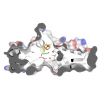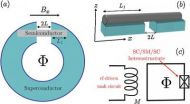(Press-News.org) ROCHESTER, Minn. -- Mayo Clinic researchers have identified a new therapy for patients with neuromyelitis optica that appears to stop inflammation of the eye nerves and spinal cord. NMO is a debilitating central nervous system disorder that is often misdiagnosed as multiple sclerosis (MS). In the study, patients with severe symptoms of the disease, also known as NMO, were given eculizumab, a drug typically used to treat blood disorders.
While not a cure, the therapy Mayo Clinic researchers used in the study to halt attacks could potentially lead to longer attack-free periods for the thousands of NMO patients worldwide. The research is being presented Oct. 9 at the American Neurological Association Annual Meeting in Boston.
NMO manifests itself in attacks that can cause blindness in one or both eyes, weakness or paralysis in the legs or arms, painful spasms, loss of sensation, and bladder or bowel dysfunction from spinal cord damage. Attacks may be reversible, but can be severe enough to cause permanent visual loss and problems with walking. NMO can affect children as young as 2 and adults as old as 90. It is more prevalent in females than males, but affects all racial and ethnic groups. Immunosuppressants are the first line of treatment for NMO.
Mayo Clinic researchers have been international leaders in NMO diagnosis and treatment. In 2004, Mayo Clinic researchers discovered the antibody NMO-IgG -- the first serum biomarker for any form of inflammatory demyelinating brain disease. A year later, they identified the target of the antibody as the water channel aquaporin 4. These discoveries helped physicians better understand the cause and potential treatments for NMO.
Mayo researchers studied 14 NMO patients with active and severe disease symptoms, defined as two attacks in the previous six months, or three within the past year. When the NMO-IgG antibody binds to its target on brain cells, it activates complement, a substance that can kill or injure these brain cells. Patients
were treated with eculizumab, an antibody that stops complement from being activated. All 14 study participants received the treatment intravenously every two weeks for one year.
"Disability in NMO is attack related and these attacks are usually severe. If untreated, they can have devastating, irreversible effects on function," says lead author Sean Pittock, M.D., a Mayo Clinic neurologist. "If we can stop the attacks in NMO -- and it appears we can -- then we can hopefully prevent disability and allow patients to maintain function and a good quality of life.
Twelve patients were symptom free throughout the year of treatment. Two patients had one attack each, but these were mild and considered by the investigators to be "possible, not definite" attacks. One experienced mild back pain but had no new findings on neurologic examination or MRI scan of the spinal cord. The other experienced mild visual blurring in the right eye but also was receiving antibiotic therapy for a presumed urinary tract.
Because NMO has only recently been identified as a syndrome distinct from MS, knowing how many people have it is difficult. Mayo is studying NMO's prevalence. Mayo Clinic's Neuroimmunology Laboratory so far has detected the antibody in roughly 3,500 U.S. patients.
"We've learned there are many people who fit within the NMO spectrum who, in the past, were believed to have MS," says co-author Dean Wingerchuk, M.D., a neurologist at Mayo Clinic in Arizona. "In addition, distinguishing NMO from MS is important for preserving the validity of therapeutic trials for MS by not enrolling patients with NMO."
###The study was funded by Alexion Pharmaceutical, which makes eculizumab.
About Mayo Clinic
Mayo Clinic is a nonprofit worldwide leader in medical care, research and education for people from all walks of life. For more information, visit http://www.mayoclinic.org/about/ and http://www.mayoclinic.org/news/.
Mayo Clinic researchers stop neuromyelitis optica attacks with new therapy
2012-10-09
ELSE PRESS RELEASES FROM THIS DATE:
Dead stars could be the future of spacecraft navigation
2012-10-09
Scientists at the National Physical Laboratory (NPL) and the University of Leicester have been commissioned by the European Space Agency (ESA) to investigate the feasibility of using dead stars to navigate spacecraft in deep space. The findings of the research will advise ESA strategy and if feasible this technique may in future revolutionise the way spacecraft navigate in the outer Solar System and beyond.
Spacecraft navigation currently relies on radio transmissions between a distant craft and a network of ground-stations on Earth. This means that the craft has to ...
IspH -- a protein free to choose its partners
2012-10-09
This press release is available in German.
The iron-sulfur protein IspH plays a central role in the terpene metabolism of several pathogens. The mechanism of the reaction provides an approach for developing new antibiotics, particularly against malaria and tuberculosis. While researching this enzyme, biochemists at the Technische Universitat Munchen discovered a previously unknown reaction: IspH accepts two completely different classes of molecules as partners. This surprising insight, published in Nature Communications, opens up new perspectives in combating infectious ...
Scientists discover gene behind rare disorders
2012-10-09
Scientists at the Montreal Neurological Institute and Hospital – The Neuro, McGill University working with a team at Oxford University have uncovered the genetic defect underlying a group of rare genetic disorders.
Using a new technique that has revolutionized genetic studies, the teams determined that mutations in the RMND1 gene were responsible for severe neurodegenerative disorders, in two infants, ultimately leading to their early death. Although the teams' investigations dealt with an infant, their discovery also has implications for understanding the causes of ...
Chaperone protein subverts removal of glaucoma-causing protein
2012-10-09
Tampa, FL (Oct. 8, 2012) -- The chaperone protein Grp94 can interfere with the clearance of another protein known to cause the glaucoma when mutated, a new study led by researchers at the University of South Florida has found. Using a cell model, the researchers also demonstrated that a new specific inhibitor of Grp94 facilitates clearance of the genetically-defective protein, called myocilin, from cells.
Reported online this month in JBC (The Journal of Biological Chemistry), the discoveries could lead to a new treatment for some hereditary cases of glaucoma, an eye ...
Topological superconductors
2012-10-09
If quantum computers are ever going to perform all those expected feats of code-breaking and number crunching, then their component qubits---tiny ephemeral quantum cells held in a superposition of internal states---will have to be protected from intervention by the outside world. In other words, decoherence, the loss of the qubits' quantum integrity, has to be postponed. Now theoretical physicists at the Joint Quantum Institute (JQI) and the University of Maryland have done an important step forward to understand qubits in a real-world setup. In a new study they show, ...
Bioenergy - The broken promise
2012-10-09
Biofuels are going to save us from climate threats and the oil crisis, while at the same time providing an opportunity to the smallholder farmers of the world. Hopes are high, but completely unrealistic. It is like trying to push a square peg into a round hole, according to a current thesis at Linköping University.
Bioenergy could replace fossil fuels and solve the looming energy crisis. Into the bargain, we will benefit from reduced greenhouse gas emissions. A further bonus could be that demand for biofuels gives a lift to smallholder farmers in poor countries, who would ...
Doubling up on advanced prostate cancer with PARP inhibitors
2012-10-09
A newly discovered function of PARP-1 could be the key to more effective therapeutics to treat advanced prostate cancer patients, a recent preclinical study published in Cancer Discovery by Jefferson's Kimmel Cancer Center researchers suggests.
The team, led by Karen E. Knudsen, Ph.D., Professor in the Departments of Cancer Biology, Urology, & Radiation Oncology at Thomas Jefferson University, found that functions of PARP-1 not only include DNA damage repair but also androgen receptor (AR) regulation in advanced prostate cancer growth and progression. PARP inhibition ...
Chronic kidney disease alters intestinal microbial flora, UCI study finds
2012-10-09
Irvine, Calif., Oct. 9, 2012 – Chronic kidney disease changes the composition of intestinal bacterial microbes that normally play a crucial role in staving off disease-causing pathogens and maintaining micronutrient balance, according to UC Irvine researchers.
This profound alteration of the gut microbial population may contribute to the production of uremic toxins, systemic and local inflammation, and nutritional abnormalities present in patients with advanced renal disease, they said.
Study leader Dr. N.D. Vaziri of the UCI School of Medicine's Division of Nephrology ...
Drawing a line, with carbon nanotubes
2012-10-09
CAMBRIDGE, Mass. -- Carbon nanotubes offer a powerful new way to detect harmful gases in the environment. However, the methods typically used to build carbon nanotube sensors are hazardous and not suited for large-scale production.
A new fabrication method created by MIT chemists — as simple as drawing a line on a sheet of paper — may overcome that obstacle. MIT postdoc Katherine Mirica has designed a new type of pencil lead in which graphite is replaced with a compressed powder of carbon nanotubes. The lead, which can be used with a regular mechanical pencil, can inscribe ...
Academic achievement improved among students active in structured after-school programs
2012-10-09
School-age children who participate in structured after-school activities improve their academic achievement, according to a new study from Southern Methodist University, Dallas.
The study by researchers in SMU's Simmons School of Education and Human Development measured academic performance of students enrolled in Boys and Girls Clubs of Greater Dallas.
"Boys and Girls Clubs of Greater Dallas and other structured programs are really having a positive impact," said Ken Springer, an associate professor. "We believe that the homework support that the clubs consistently ...


